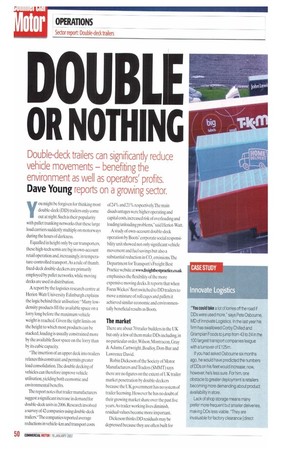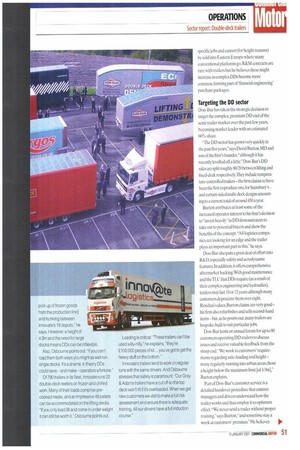Innovate Logistics
Page 50

Page 51

If you've noticed an error in this article please click here to report it so we can fix it.
"You could take a lot of lorries off the road if DDs were used more," says Pete Osbourne, MD of Innovate Logistics. In the last year his firm has swallowed Corby Chilled and Grampian Foods to jump from 43 to 24 in the 100 largest transport companies league with a turnover of £125m.
If you had asked Osbourne six months ago, he would have predicted the numbers of DDs on his fleet would increase: now, however, he's less sure. For him, one obstacle to greater deployment is retailers becoming more demanding about product availability in store.
Lack of shop storage means many prefer more frequent but smaller deliveries. making DDs less viable. "They are invaluable for factory clearance [direct pick up of frozen goods from the production line] and trunking between Innovate's 19 depots," he says. However, a height of 4.9m and the need for large docks means DDs can be inflexible.
Also, Osbourne points out: "If you can't load them both ways you might as well run single decks. It's a shame: in theory DDs could save and make —operators a fortune." Of 790 trailers in its fleet, Innovate runs 22 double-deck reefers on frozen and chilled work. Many of their loads comprise precooked meals, and an impressive 48 pallets can be accommodated on the lifting decks. "If you only load 36 and come in under weight it can still be worth it," Osbourne points out. Loading is critical: "These trailers can't be used willy-nilly," he explains, "they're £100,000 pieces of kit... you've got to get the heavy stuff on the bottom."
Innovate's trailers tend to work on regular runs with the same drivers. And Osbourne stresses that safety is paramount: "Our Gray & Adams trailers have a cutoff so the top deck won't lift if it's overloaded. When we get new customers we visit to make a full risk assessment and ensure there is adequate training. All our drivers have a full induction course."






















































































































































































